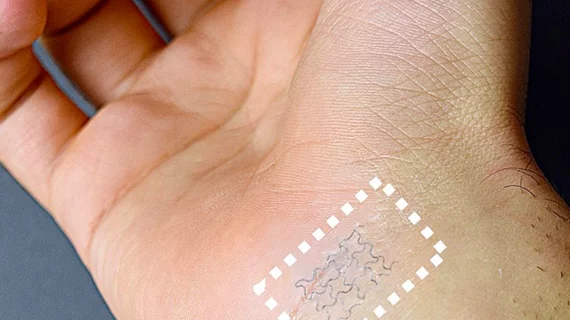Purdue introduces cardiology’s latest wearable: A paper-thin, plant-based sticker
A team at Purdue University in West Lafayette, Indiana, this week announced progress on its latest cardiology wearable: a plant-based, stretchable wrist sticker that has the ability to monitor physical activity and alert users to health risks in real-time.
The epidermal paper-based electronics (EPEDs)—or “smart stickers,” as team leader and Purdue professor Ramses Martinez, PhD, calls them—are made out of cellulose, which is both breathable and biocompatible. Each sticker is serpent-shaped to ensure it’s as thin and stretchable as the wearer’s skin.
“For the first time, we have created wearable electronic devices that someone can easily attach to their skin and are made out of paper to lower the cost of personalized medicine,” Martinez said in a release from Purdue.
He said the stickers aren’t just cost-efficient—they also have a wide range of applications. The technology can be applied to skin like a removable tattoo, but physicians can also implant the stickers in patients whose sleep patterns they want to monitor, for example, since the product conforms to internal organs easily without causing any adverse events.
Paper degrades quickly when it’s wet, so the team took precautions to make its stickers resistant to water, oil, dust and bacteria. Because of that, Martinez said athletes can use the technology to monitor their health stats during workouts, including swimming.
Martinez et al.’s development is patented through Purdue, and it’s still in testing. He said it takes just about a nickel to produce one sticker.
“The low cost of these wearable devices and their compatibility with large-scale manufacturing techniques will enable the quick adoption of these new fully disposable, wearable sensors in a variety of healthcare applications requiring single-use diagnostic systems,” he said.
Martinez et al. published their most recent findings in ACS: Applied Materials and Interfaces.

